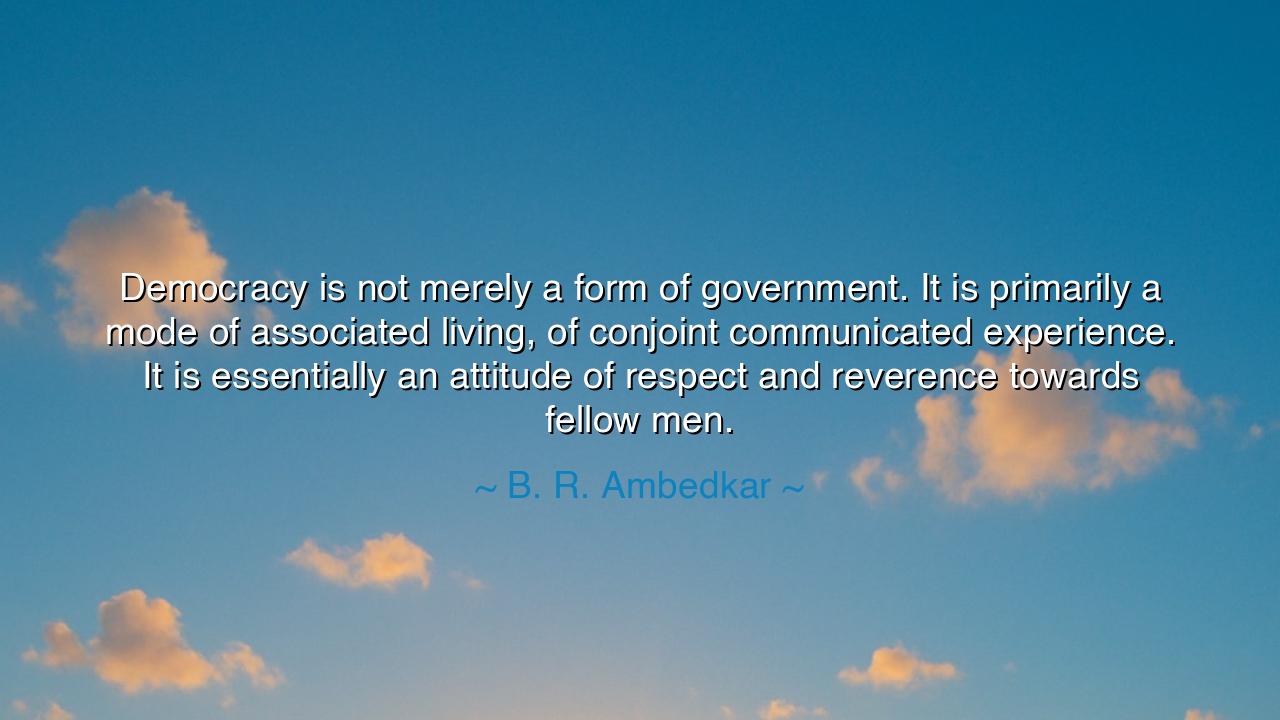
Democracy is not merely a form of government. It is primarily a
Democracy is not merely a form of government. It is primarily a mode of associated living, of conjoint communicated experience. It is essentially an attitude of respect and reverence towards fellow men.






Host: The calm of the evening filled the room, creating a thoughtful space for reflection. Jack sat at the table, his fingers resting lightly on his cup, contemplating B. R. Ambedkar’s words. Jeeny stood near the window, her gaze directed outward, considering the deeper meaning behind the statement.
Jeeny: “I’ve been thinking about what B. R. Ambedkar said: ‘Democracy is not merely a form of government. It is primarily a mode of associated living, of conjoint communicated experience. It is essentially an attitude of respect and reverence towards fellow men.’ It’s such a profound take on what democracy really means, isn’t it? The idea that democracy is not just about a political system or structure, but about how we live and interact with one another. It’s about respect, communication, and shared experience.”
Jack: “Yes, exactly. Ambedkar is showing us that democracy is more than just the framework of laws and institutions—it’s about how we live together, how we treat each other on a day-to-day basis. Democracy isn’t just about voting or having a voice in government; it’s about fostering an environment of respect and mutual understanding in all of our interactions. It’s about valuing each other’s voices, experiences, and worth.”
Jeeny: “Right. And I think what’s powerful about this is how Ambedkar emphasizes the attitude of democracy. It’s not just about structures, but about the underlying mindset we bring to our interactions. If we truly embrace democracy, it means treating others with reverence, acknowledging their dignity, and engaging in conversations that foster shared understanding. Democracy requires us to approach each other with respect, regardless of differences.”
Host: The stillness in the room deepened as they both reflected on how democracy transcends beyond just political institutions. Jack’s fingers rested on the table, while Jeeny’s expression softened, considering the implications of living in a democracy that values respect and communication at its core.
Jack: “It makes me think about how we often reduce democracy to something transactional—something that happens every few years when we go to the polls. But Ambedkar is showing us that democracy is a way of life. It’s the everyday attitude we carry toward each other. Democracy thrives not just in laws, but in how we treat one another and how we listen to each other. It’s about building a community where everyone’s voice matters.”
Jeeny: “Exactly. Ambedkar reminds us that true democracy isn’t just about institutional power—it’s about humanity. When we approach others with respect and reverence, we’re creating a more inclusive and equitable society. Democracy becomes a living, breathing practice that we carry with us in all our interactions, not just something we experience during an election.”
Jack: “And I think that’s the key—communication and respect. Without those two elements, democracy can become a hollow structure. It’s the everyday engagement between people, the willingness to listen and learn from one another, that makes democracy real and impactful. It’s not just about having the right to speak, but about valuing the other person’s right to speak and creating space for their voice to be heard.”
Jeeny: “Yes, and I think that’s what makes this so powerful—Ambedkar is showing us that democracy isn’t something we just experience in moments of voting or in political debate. It’s a continuous attitude of respect, understanding, and communication. It’s about how we interact every single day, in our communities, in our families, and in our conversations. Democracy is truly alive when we are committed to mutual respect and shared experience.”
Host: The quiet in the room grew deeper as they reflected on the essence of democracy. B. R. Ambedkar had shown them that true democracy is more than just a system of governance—it is a mindset, a way of living together in mutual respect and communication. Jack leaned back slightly in his chair, while Jeeny’s gaze turned from the window back to him, both of them understanding the profound implications of Ambedkar’s words.
Jack: “So, Ambedkar is really showing us that democracy is about more than just voting or governance. It’s about how we live together, how we respect each other, and how we communicate as equals. It’s an ongoing practice of shared humanity.”
Jeeny: “Exactly. Ambedkar reminds us that democracy is about embracing mutual respect, valuing others, and engaging in communication that brings us closer together. It’s not just a political system—it’s a way of life that shapes how we see and treat each other.”
Host: The evening had fully settled in, the quiet understanding between them a reminder that democracy is not just a form of government, but a way of living together in respect and communication. B. R. Ambedkar had shown them that true democracy thrives not just in laws, but in the everyday attitude of valuing each other’s voices and experiences. The world outside had darkened, but inside, there was light—a recognition that freedom and equality are rooted in the shared humanity and respect that define a truly democratic society.






AAdministratorAdministrator
Welcome, honored guests. Please leave a comment, we will respond soon